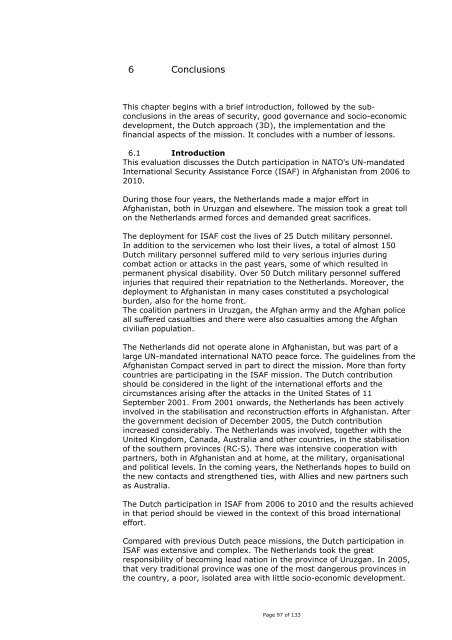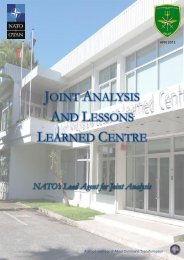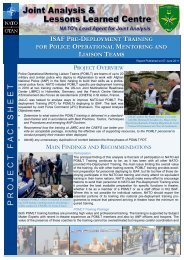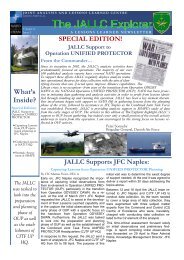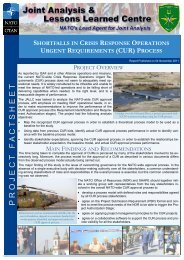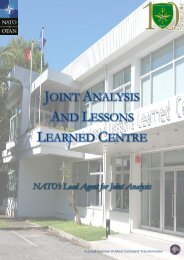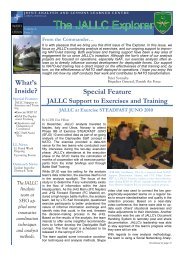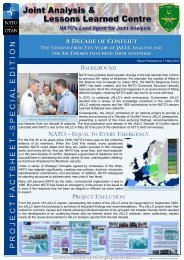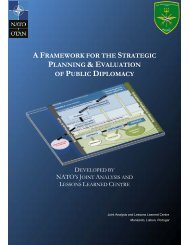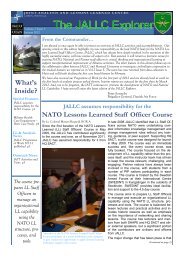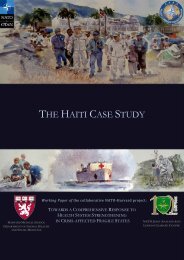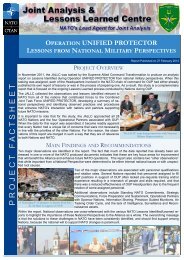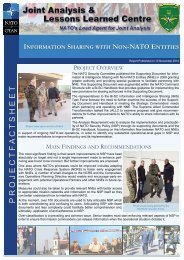Final evaluation Netherlands participation in ISAF 2006 - 2010
Final evaluation Netherlands participation in ISAF 2006 - 2010
Final evaluation Netherlands participation in ISAF 2006 - 2010
Create successful ePaper yourself
Turn your PDF publications into a flip-book with our unique Google optimized e-Paper software.
6 ConclusionsThis chapter beg<strong>in</strong>s with a brief <strong>in</strong>troduction, followed by the subconclusions<strong>in</strong> the areas of security, good governance and socio-economicdevelopment, the Dutch approach (3D), the implementation and thef<strong>in</strong>ancial aspects of the mission. It concludes with a number of lessons.6.1 IntroductionThis <strong>evaluation</strong> discusses the Dutch <strong>participation</strong> <strong>in</strong> NATO's UN-mandatedInternational Security Assistance Force (<strong>ISAF</strong>) <strong>in</strong> Afghanistan from <strong>2006</strong> to<strong>2010</strong>.Dur<strong>in</strong>g those four years, the <strong>Netherlands</strong> made a major effort <strong>in</strong>Afghanistan, both <strong>in</strong> Uruzgan and elsewhere. The mission took a great tollon the <strong>Netherlands</strong> armed forces and demanded great sacrifices.The deployment for <strong>ISAF</strong> cost the lives of 25 Dutch military personnel.In addition to the servicemen who lost their lives, a total of almost 150Dutch military personnel suffered mild to very serious <strong>in</strong>juries dur<strong>in</strong>gcombat action or attacks <strong>in</strong> the past years, some of which resulted <strong>in</strong>permanent physical disability. Over 50 Dutch military personnel suffered<strong>in</strong>juries that required their repatriation to the <strong>Netherlands</strong>. Moreover, thedeployment to Afghanistan <strong>in</strong> many cases constituted a psychologicalburden, also for the home front.The coalition partners <strong>in</strong> Uruzgan, the Afghan army and the Afghan policeall suffered casualties and there were also casualties among the Afghancivilian population.The <strong>Netherlands</strong> did not operate alone <strong>in</strong> Afghanistan, but was part of alarge UN-mandated <strong>in</strong>ternational NATO peace force. The guidel<strong>in</strong>es from theAfghanistan Compact served <strong>in</strong> part to direct the mission. More than fortycountries are participat<strong>in</strong>g <strong>in</strong> the <strong>ISAF</strong> mission. The Dutch contributionshould be considered <strong>in</strong> the light of the <strong>in</strong>ternational efforts and thecircumstances aris<strong>in</strong>g after the attacks <strong>in</strong> the United States of 11September 2001. From 2001 onwards, the <strong>Netherlands</strong> has been actively<strong>in</strong>volved <strong>in</strong> the stabilisation and reconstruction efforts <strong>in</strong> Afghanistan. Afterthe government decision of December 2005, the Dutch contribution<strong>in</strong>creased considerably. The <strong>Netherlands</strong> was <strong>in</strong>volved, together with theUnited K<strong>in</strong>gdom, Canada, Australia and other countries, <strong>in</strong> the stabilisationof the southern prov<strong>in</strong>ces (RC-S). There was <strong>in</strong>tensive cooperation withpartners, both <strong>in</strong> Afghanistan and at home, at the military, organisationaland political levels. In the com<strong>in</strong>g years, the <strong>Netherlands</strong> hopes to build onthe new contacts and strengthened ties, with Allies and new partners suchas Australia.The Dutch <strong>participation</strong> <strong>in</strong> <strong>ISAF</strong> from <strong>2006</strong> to <strong>2010</strong> and the results achieved<strong>in</strong> that period should be viewed <strong>in</strong> the context of this broad <strong>in</strong>ternationaleffort.Compared with previous Dutch peace missions, the Dutch <strong>participation</strong> <strong>in</strong><strong>ISAF</strong> was extensive and complex. The <strong>Netherlands</strong> took the greatresponsibility of becom<strong>in</strong>g lead nation <strong>in</strong> the prov<strong>in</strong>ce of Uruzgan. In 2005,that very traditional prov<strong>in</strong>ce was one of the most dangerous prov<strong>in</strong>ces <strong>in</strong>the country, a poor, isolated area with little socio-economic development.Page 97 of 133


